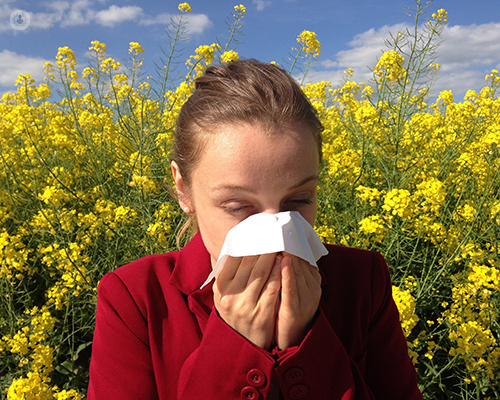Is it allergic rhinitis or another condition? Knowing when to consult a specialist
Written in association with:Allergic rhinitis, also known as hay fever, is a common condition that causes symptoms like sneezing, nasal congestion, and itchy eyes.
Dr Olympia Tsilochristou, distinguished Consultant Allergist, provides expert insight into allergic rhinitis, discussing its causes, symptoms, and when to consult a specialist to ensure an accurate diagnosis and effective treatment.

What is allergic rhinitis?
Allergic rhinitis is an inflammation of the nasal passages caused by an overreaction of the immune system to substances known as allergens in the environment. These allergens often include pollen, dust mites, pet dander, and mould spores.
When a person with allergic rhinitis is exposed to these allergens, their immune system mistakenly identifies them as harmful, prompting the release of histamine and other chemicals that cause inflammation.
What are the key symptoms of allergic rhinitis?
Symptoms of allergic rhinitis include frequent sneezing, a runny or congested nose, throat irritation, watery or red eyes, postnasal drip, and an itchy nose, throat or eyes. Some people may also experience fatigue, headaches, or ear problems as a result of the persistent inflammation.
In some cases, allergic rhinitis can mimic other conditions, such as the common cold, sinusitis, or non-allergic rhinitis. However, unlike a cold, allergic rhinitis doesn’t cause fever or body aches. Additionally, while colds are caused by viruses and resolve within a week or two, allergic rhinitis can be ongoing or seasonal, depending on the specific allergen.
When should I consult a specialist about my symptoms?
It's important to seek medical attention:
- If your symptoms persist despite using over-the-counter medications.
- If your symptoms significantly impact your daily life, including work, school, or sleep.
- If your symptoms are accompanied by complications, such as recurrent sinus infections, asthma, or shortness of breath.
A specialist, such as an allergist, can provide an accurate diagnosis and tailor a treatment plan to your needs.
How is allergic rhinitis diagnosed?
Diagnosing allergic rhinitis begins with a detailed medical history and physical examination. Your allergist may ask about the timing, frequency, and triggers of your symptoms, as well as any family history of allergies or asthma.
To confirm the diagnosis and identify specific allergens, allergy testing may then be conducted. The most common diagnostic methods include:
- Skin prick tests: A small amount of suspected allergens is applied to the skin, usually on the forearm or back. If you are allergic to the allergens, a small raised bump will appear at the test site.
- Blood tests: A blood test called specific IgE testing may be ordered to measure the levels of immunoglobulin E (IgE) antibodies in response to specific allergens. Blood tests are particularly useful for people unable to undergo skin testing due to skin conditions or certain medications.
In some cases, a nasal endoscopy may also be performed to rule out structural issues, such as nasal polyps, that can mimic symptoms of allergic rhinitis.
What are the treatment options for allergic rhinitis?
Allergic rhinitis can’t be cured, but its symptoms can be effectively managed with a combination of:
Allergen avoidance
Minimising exposure to known allergens is the first step in managing allergic rhinitis. This might involve using air purifiers, keeping windows closed during high pollen seasons, maintaining a clean home to reduce pet dander, showering after outdoor activities to remove pollen from clothes, and washing bedding frequently to reduce dust mites.
Medications
Antihistamines, either in oral or nasal spray form, are commonly prescribed to reduce sneezing, itching, and runny nose. Meanwhile, intranasal corticosteroids are highly effective in reducing nasal inflammation and congestion. Other options include decongestants for short-term relief from nasal congestion and leukotriene receptor antagonists to target specific inflammatory pathways involved in allergic responses.
Immunotherapy
For people with severe or persistent symptoms, immunotherapy may be an option. This treatment involves exposing a person’s immune system to gradually increasing amounts of the allergen(s), through injections or sublingual tablets, to desensitise the immune system over time.
If allergic rhinitis is accompanied by other conditions, such as asthma or chronic sinusitis, your allergist will provide additional treatments to address these conditions.
Working closely with your allergist is key to develop a personalised treatment plan. Many people benefit from a combination of therapies tailored to their specific needs and triggers. To book an appointment with Dr Olympia Tsilochristou, head on over to her Top Doctors profile today.


